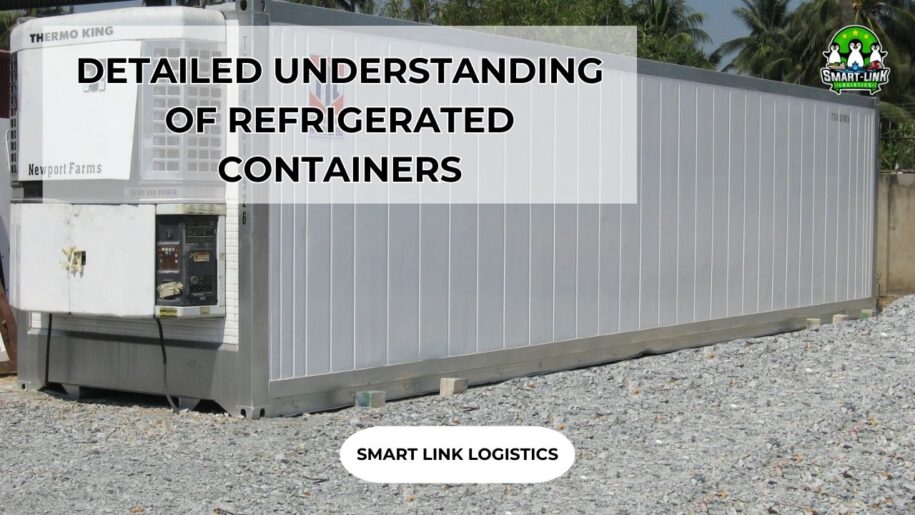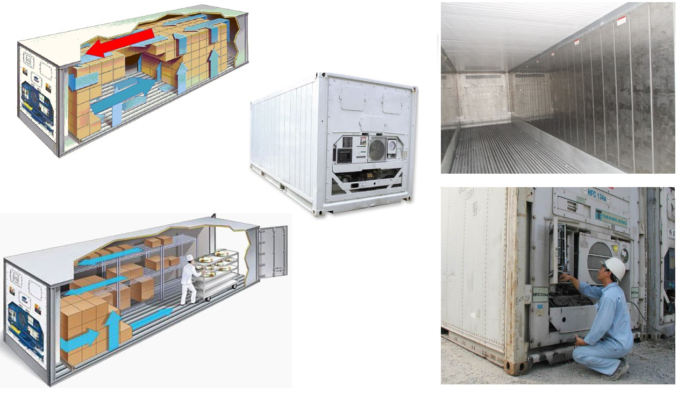
DETAILED UNDERSTANDING OF REFRIGERATED CONTAINERS
Refrigerated containers are gradually becoming a preferred alternative to traditional refrigerated ship transport. This is understandable, as refrigerated containers provide optimal temperature control and regulation. To help you better understand refrigerated containers and the related symbols, the following information will be useful.
1. Definition of Refrigerated Containers
A refrigerated container is a specialized device used for storing and transporting frozen goods, fresh produce, medical supplies, and other goods that require preservation at temperatures ranging from +30°C to -40°C. They play a crucial role in multimodal transport, allowing goods to be transported anywhere according to customer requirements.
Key features of refrigerated containers
- Cooling system: Includes a compressor, evaporator, fan, and temperature control system.
- Container body: Made from highly insulated materials to minimize heat transfer to the outside.
- Container doors: Sealed with rubber gaskets to prevent air infiltration.
- Temperature monitoring device: Helps monitor and record the internal temperature throughout the transportation process.
Refrigerated container transportation
They can be transported via road, sea, or air, each with its own advantages and disadvantages.
- Road transport: Suitable for short to medium distances, with relatively low costs.
- Sea transport: Ideal for long distances, offering lower costs compared to air transport.
- Air transport: Appropriate for urgent shipments but comes with the highest costs.
Benefits of this transport
- Goods preservation: Ensures that temperature-sensitive goods are well-preserved, reducing spoilage.
- Cost-saving: Helps reduce transport and storage costs compared to traditional methods.
- Market expansion: Allows businesses to expand to distant areas while maintaining product quality.
2. Distinctive Features of Refrigerated Containers
According to ISO 18185:2006 standards, refrigerated containers for cargo transport have the following distinctive features:
- High durability: Refrigerated containers are sturdy and can be reused multiple times.
- Easy unloading: These containers are equipped with devices for easy unloading during multimodal transport.
- Flexible design: Suitable for various transport modes without the need for unloading goods.
- Safety and control: Ensures the safety of goods and easy monitoring during storage and transport.

3. What Does the Symbol “RE” (Reefer) Mean?
Here are some common symbols of refrigerated containers to be aware of:
- RE: Short for Reefer, the general symbol for refrigerated containers used to transport temperature-controlled goods such as frozen foods, pharmaceuticals, vaccines, and medical supplies.
- RF: This symbol comes with the container’s size, such as 20 feet RF, indicating a refrigerated container (Reefer) with a size measured in feet.
- RH: This symbol also comes with container size, such as 50 feet RH, where “High Cube” refers to a container that is taller than standard containers.
4. Types of Refrigerated Containers
Below is a classification of common refrigerated containers, providing you with more options based on your needs and budget:
- 10-foot: Compact and flexible, suitable for warehouses with limited space.
- 20-foot RF: Available in two sizes, ideal for transporting food, seafood, and fruit.
- 40-foot RF: Meets the need for transporting large volumes of goods with high safety and hygiene standards.
- 40-foot HR: Larger in size, equipped with refrigeration units to meet specific requirements.
- 45-foot HR: The largest size, typically used for domestic transport or cross-border import/export.
With this information, understanding the refrigerated containers and their symbols is no longer a challenge. We hope these insights will be useful to you. We are committed to offering you services and solutions that help your goods reach global markets with dedication and customer collaboration. With over 13 years of experience in the logistics industry, we take pride in being a reliable and professional partner.
Hotline: + 84 935 766 039 to know more about our services

If you require assistance with international import and export of goods, please contact our team at Smartlink Logistics. We are available to provide you with professional guidance on our services and the necessary customs procedures.
SMART LINK: BEST SERVICE BEST YOU


































